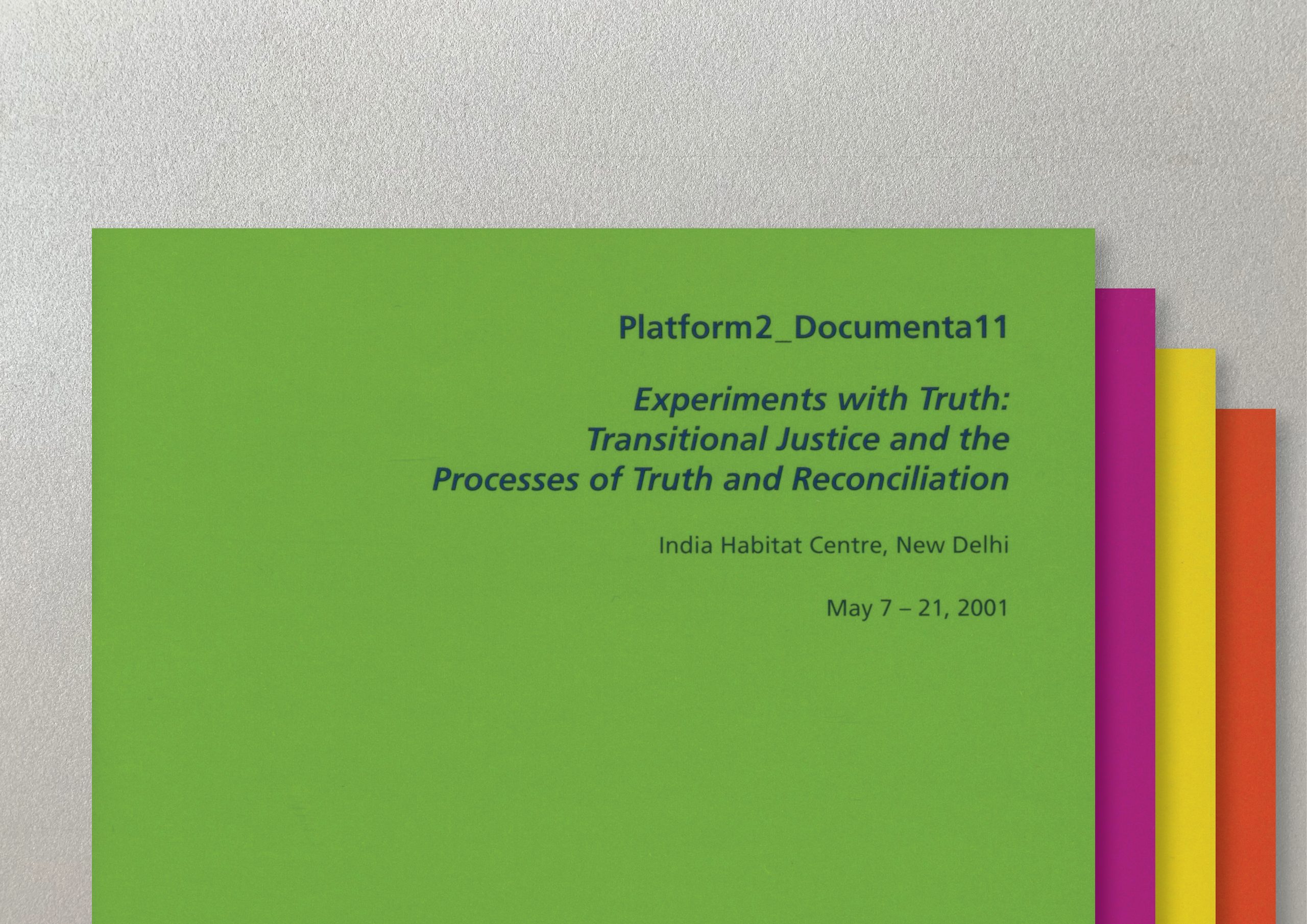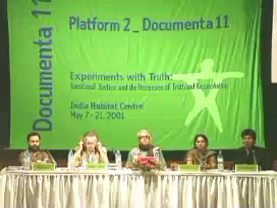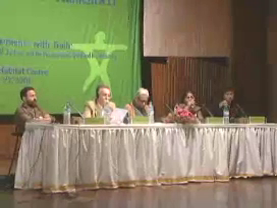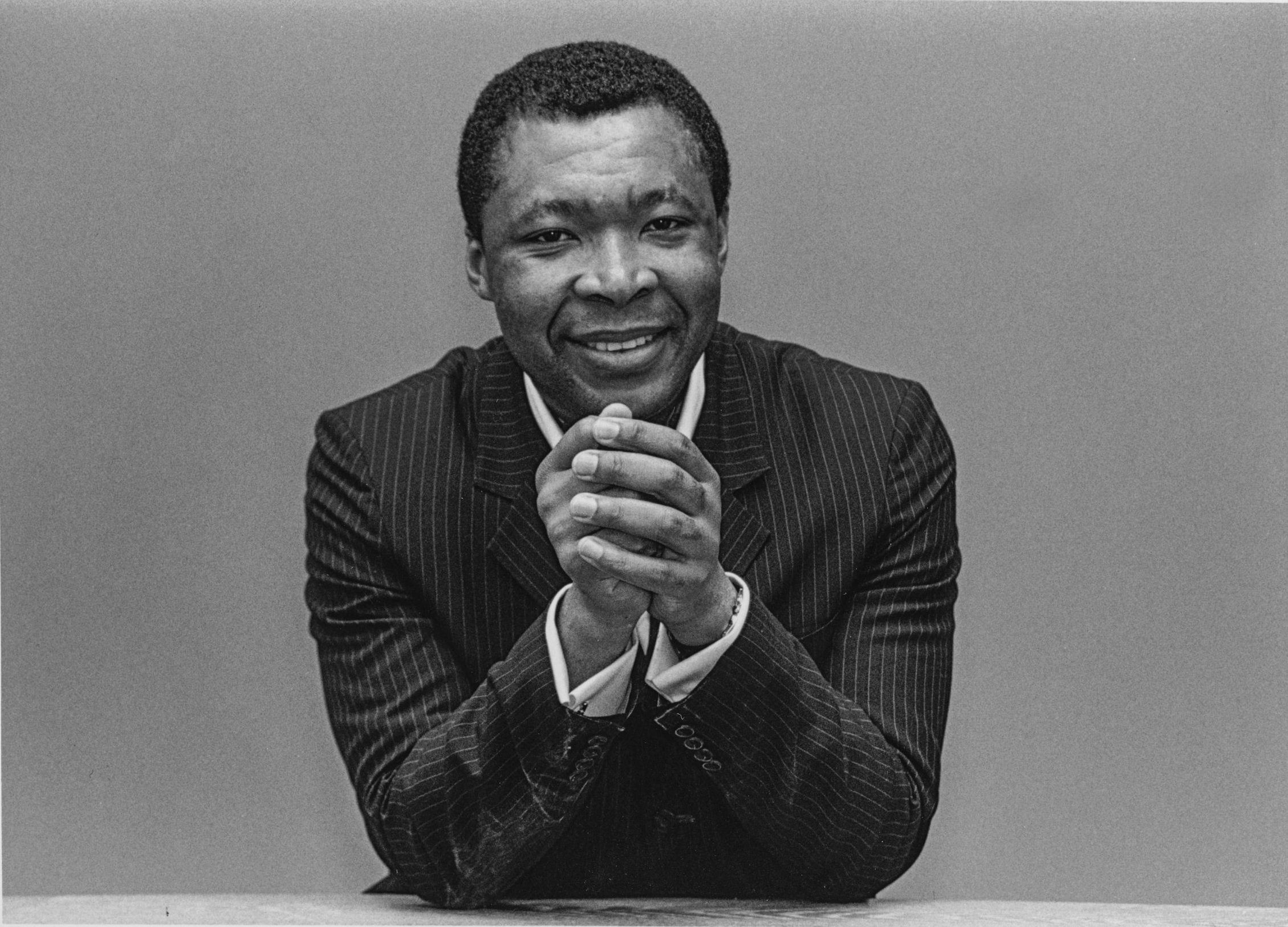Platform2Truth 2001
Platform2 Experiments with Truth: Transitional Justice and the Processes of Truth and Reconciliation
CloseChapters
Platform2 Experiments with Truth: Transitional Justice and the Processes of Truth and Reconciliation

© documenta archiv
Introduction
In the last two decades a series of juridical inquiries, as well as political and social assessments have been initiated all over the world to consider the nature of state impunity and wanton violence against its people and others, and on conflicts from which have arisen strong cases of genocideand gross human rights violations. Until recently, juridical bodies, empowered by the overwhelming evidence of such violence and gross human rights violations have been the primary means of bringing these cases into the social context of societies in transition and undergoing political reorganization. However, the trauma of loss and the debilitating aspect of its impact on collective psyche have increasingly called for other mechanisms that could build a credible bridge between the juridical form of justice on the one hand and on the other the personal need of victims stories to be heard and entered into the historical record.
The answer to the search for this credible bridge has been the establishment of numerous “truth commissions” around the world. But what happens when neither truth commissions nor juridical inquiries are unable to heal the rift that have so often divided societies where they have been implemented? Today there is an overwhelming historical interest in the work of these commissions by scholars, non-governmental organizations, museums, media, as well as the emergence of a category in the
humanities dedicated to the study of memory. One central problematic to this interest, especially for philosophy, is to answer the question: “What constitutes truth?” But as often is the case, juridical truth as a largely secular endeavour, when counterposed to the quasi-religious dimension of “truth and reconciliation” may produce unsatisfactory answers
for victims and their families and resistance by individuals and institutions spotlighted by their record of abuse.
While scepticism by victims, and resistance by perpetrators have constantly called into question the efficacy of this transitional endeavour, and the result of the inquiries have also increasingly come into dispute, the broader implications of the work undertaken by the various constituted bodies of inquiry (juridical and otherwise) have called for new assessments of these commissions. Nonetheless, many of the decisions that have accompanied their findings have continued to be debated within the structures of civil society. It is the aim of this conference to analyze and produce a debate around the historical work that has emerged from the study of these commissions and the philosophical, political theories, as well as artistic and cultural responses that have accompanied them.
Concerning Violence
The catastrophic fate of European Jewry during the years of National Socialism in Germany and the subsequent calamity of the holocaust for both Jews and other minorities under the Third Reich have continued to press on contemporary thinkers and historians the difficult task of coming to terms with its features. While the holocaust or Shoah remains representative of a form of state crime and violence against both its own people and opponents, its overwhelming singularity is today tested by other systemic state violence and repression such as in the cases of South Africa, Argentina, Cambodia, Rwanda, Chile, Guatemala, Chad, Algeria, Bosnia, Kosovo, Belgium, France, Northern Ireland, Kurdistan, The United States and Mexico.
As was made clear by the Pinochet extradition case, the discourse around state impunity and violence is a contentious one. The details of the violent actions by the state have over the past decades been confronted and engaged by two assumptions: one centered around the secular issue of law, the other within an ambiguous religious ethic of “truth and reconciliation” as moments where the violations of the state and its agents are brought to light. While the expressibility of the law is mostly concerned with the legality of the state's actions and individuals acting within the state (a central thesis of the Nuremberg trials and Adolf Eichmann’s trial in Jerusalem), as has “Truth Commissions” recently emerged in the lexicon of the search for answers to genocide and state repression seek to engage the dimension of the social and political space, a space of collective bargaining within civil society.

© documenta archiv / Video: documenta und Museum Fridericianum Veranstaltungs-GmbH
As has been recently observed, the method of the law and that of “Truth Commissions” are not symmetrically aligned, but are instead diametrically opposed to each other. South Africa's example makes this disalignment patently clear. For many victims the unaccountable power and violence of the state is so overwhelming that its very representation and narration requires the grain of the victim’s voice to counter the narrow construction of law and to bring the lucidity of truth into the public
imagination.
Experiments with Truth
Mahatma Gandhi titled his autobiography The Story of My Experiments with Truth and in conceiving this expression – “experiments with truth” – he touched upon the complex intersection between truth, justice, and representation which presented itself at the time of postcolonial transition in India and South Africa.
In the past half century Gandhi's critical inquiry into the notion of truth has grown even more salient, encompassing other conflicts such as ethnic, religious, and sectarian violence. Today the search for “truth” proliferates into an array of perspectives. Politics in India and Pakistan, South Africa, Algeria, Argentina, Chile, Northern Ireland, The Basque region of Spain and France; the demand for justice and recognition of the Romany, and beyond expose truth as variously constituted. Truth both as a governing principle in the search for justice and reconciliation is also an ontological, ethical, juridical, and philosophical problem to analyze. From the foregoing has variously emerged such notions as juridical truth, narrative truth, experiential truth, ontological truth, performative truth, etc., each with their own pressing demand for precision.
Just as historical contingency brings each of these truths into convergence with one another, it also brings them into contest. In the most adverse cases, this contestation over truth materializes as fundamentalist polemicism and political violence, in other cases it represents a sober reassessment of the fabric of civil society. The notion of truth for philosophy is in itself an aporia, while for jurisprudence it merely works to situate culpability relative to testimony, evidence, and provability. Reconciliation in general terms works in theory as a mechanism to bring the two together and has its roots neither in philosophy nor in jurisprudence, but is situated somewhere between cultural and religious logic. Therein lies the paradox of what truth must express: is it principally forensic or ineluctably abstract and contingent?
Transitional Justice
Today confrontations with colonial, ethnic, racial, gender, religious, civil violence and the spate of nationalisms that have risen in their wake press upon liberal reformers to produce new concepts of justice. Part of this contemporary challenge is further complicated by the end of the cold war, dissolution of the Soviet Union and the emergence of new democratic regimes in Eastern Europe, as well as the dismantling of dictatorships in a number of Latin American countries. Wherever these transitions are occurring new juridical principles have been theorised to examine the nature of justice and accountability. Thus the legal category of transitional justice has been instituted in a number of areas to deal with crimes committed under now defunct regimes and states. The recent case of the former East Germany and changes in South Africa have brought to crisis the matters of truth and transitional justice. The struggle to dismantle the legacy of communism and the apartheid state and to implement liberal democracy entails a confrontation with the state’s violent history. As liberal democracies work to come to terms with this violence, they also reconstitute the relationship between the state and its citizens as the case of the ex-Yugoslavia have revealed. But does the mere repudiation and discredit of former repressive regimes square properly with the logic and concept of justice in cases of extreme violation? This reconfiguration poses new challenges with regard to representation, both in its political and in its cultural modes and forces a further rift between the ideals of liberal reformers and institutions, and the nature of justice they claim to administer in the name of a larger global ethic
Memory, Narration, and Representation

© documenta archiv / Video: documenta und Museum Fridericianum Veranstaltungs-GmbH
How to bear witness and ensure democratic representation? How to remember and represent the past and historicize its reality? As many countries and cultures are confronted with the legacy of their past and history, so has emerged a great desire to commemorate that past and history around broadly accepted thematics that unite various polities within the nation. Such desire constitute another area in the search for truth. It calls for mechanisms to both represent and narrate the truth. The need for commemoration have generated a spate of monuments and memorials which presumably represent a nation’s heritage. The South African case has only amplified the tensions between collective memory and official history that have subtended the cultures of other regions in the past decades, most notably Latin America and Central Europe. The spectral voices of the politically disenfranchised, the disappeared, and the exterminated come into accord, if only for a moment.
Where law and scholarship convene around the aporias of trauma and testimony, works of art and literature have emerged that give form to the remnants of these histories. Whereas each of these cultural fields offers a singular perspective on the limits of witnessing and the limits of representation, recent investigations in philosophy have drawn upon these perspectives to enable an larger critique of universal truth. If Western humanism and rationality always rest upon some agency of exclusion, what are the limits of their application to contemporary crimes against humanity?
At this crux modern philosophy meets the postcolonial struggle which Gandhi set into motion. Experiments with Truth: Transitional Justice and the Processes of Truth and Reconciliation seeks to animate the intellectual and creative methods that underpin the social, cultural, political, juridical, religious and philosophical confrontation with one of the central preoccupations of the twentieth century. It is the intention of this conference to examine not only the central arguments that form the core of the juridical and social methods of “Truth Commissions” as they pertain to state crime and violence; it also argues for a sober reflection on other complex conflicts (ethnic, racial, religious, and sectarian) that are seen as extra-territorial and marginal to the discourse of the search for truth and reconciliation.
Contributors of Platform2:
Shahid Amin, Yadh Ben Achour, Rory Bester, Rustom Bharucha, Boris Buden, Urvashi Butalia, Manthia Diawara, Vojin Dimitrijević, María José Guembe, Alfredo Jaar, Franz Kaltenbeck, Gurjot Malhi, Mahmood Mamdani, Avishai Margalit, Geneviève Morel, Lolle Nauta, Albie Sachs, Dilip Simeon, Eyal Sivan, Susan Slyomovics, Barbara Maria Stafford, Ruti Teitel and Susana Torre.
Documenta11 Brochure
Platform2: Experiments with Truth: Transitional Justice and the Processes of Truth and Reconciliation in New Dehli is organized by Documenta11 in collaboration with the Prince Claus Fund for Culture and Developement, and in cooperation with the Visual Arts Gallery of the India Habitat Centre, New Dehli.
Platform2 functions in conjunction with the Documenta11 / Prince Claus Fund-seminar on Truth and Reconciliation, which was held in The Hague in July 2000.
Concept
Okwui Enwezor
New Dehli Coordinator
Alka Pande
Research
Charity Scribner
Editing
Angelika Nollert, Karin Rebbert, Charity Scribner
Film and Video Program Coordination
Stephanie Mauchm Karin Rebbert
Design
Ecke Bonk and atelier groteske
Print date: 05/01
Signature: docA, AA, d11, File 101, fol. 2
